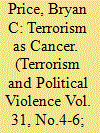|
|
|
Sort Order |
|
|
|
Items / Page
|
|
|
|
|
|
|
| Srl | Item |
| 1 |
ID:
112467


|
|
|
|
|
| Publication |
2012.
|
| Summary/Abstract |
Several states, including Israel and the United States, have put decapitation tactics, which seek to kill or capture leaders of terrorist organizations, at the forefront of their counterterrorism efforts. The vast majority of scholarly work on decapitation suggests, however, that leadership decapitation is ineffective at best and counterproductive at worst. Contrary to this conventional wisdom, leadership decapitation significantly increases the mortality rate of terrorist groups, although the results indicate that the effect of decapitation decreases with the age of the group, even to a point where it may have no effect at all. This finding helps to explain the previously perplexing mixed record of decapitation effectiveness. Terrorist groups are especially susceptible to leadership decapitation because their organizational characteristics (they are violent, clandestine, and values based) amplify the difficulties of leadership succession. Additionally, in contrast to the conventional wisdom regarding the durability of terrorist groups, politically relevant terrorist groups (defined as those with at least four attacks including one attack resulting in a fatality) endure significantly longer than previously believed.
|
|
|
|
|
|
|
|
|
|
|
|
|
|
|
|
| 2 |
ID:
169925


|
|
|
|
|
| Summary/Abstract |
This paper provides an alternative framework that conceptualizes the threat posed by terrorism based on an epidemiological approach that views it as a chronic disease like cancer rather than as a military, ideological, or socio-economic problem. After highlighting the similarities in the causes, behavior, treatments, and challenges of combating terrorism and cancer, this paper presents a staging system policymakers can use to educate the public and allocate counterterrorism resources more efficiently. This approach encourages policymakers to see terrorism for what it is (an all but inevitable facet of modern life that can be managed but never fully eliminated), and not what they wish terrorism to be (a national security problem that can be solved, defeated, or vanquished). It provides policymakers with a useful model to conceptualize the threat and treat terrorism in a comprehensive manner, from preventing future attacks to effectively responding to them when they will inevitably occur.
|
|
|
|
|
|
|
|
|
|
|
|
|
|
|
|
|
|
|
|
|